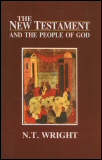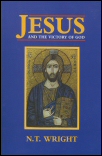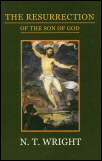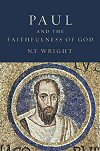Christian Origins and the Question of God Series (4 vols.)
Digital Logos Edition
Overview
This collection contains the first four books of N.T. Wright’s highly-praised Christian Origins and the Question of God series. Included here are The New Testament and the People of God, Jesus and the Victory of God, The Resurrection of the Son of God, and the latest, Paul and the Faithfulness of God. As an important scholar of the New Testament and a prolific author and lecturer, Wright’s works have been highly influential in the study of Jesus, Paul, and early Christianity.
In the first volume of the series, Wright offers a historical, theological, and literary study of first-century Judaism and Christianity, beginning with an introduction to the historical and theological condition of the earliest Christians. Next, Wright contributes to the current quest for the historical Jesus, offering his own defense of Jesus’ historicity and its impact on Christian belief and practice in Jesus and the Victory of God. Wright then examines resurrection—both resurrection in general and of Jesus in particular—beginning with Paul, and working through the end of the second century in the third volume, The Resurrection of the Son of God. The highly anticipated fourth volume, Paul and the Faithfulness of God, is the mature summation of a lifetime of study. This landmark volume pays a rich tribute to the breadth and depth of the Apostle Paul’s vision, and offers an unparalleled wealth of detailed insights into his life, times, and impact.
Exploring Wright’s work with Logos enhances and accelerates your experience. Scripture citations link directly to English translations, and important terms link to dictionaries, encyclopedias, and a trove of other resources in your digital library. Bolster your study of these works by cross-referencing and comparing with an extensive library of scholarship on these topics. With a few clicks you can see what other scholars, theologians, and pastors have to say about the historical Jesus, Paul, the Resurrection, and much more. With Logos Bible Software, the most efficient and comprehensive research tools are in one place, so you get the most out of your study.

- Four completed books in Wright’s projected six-volume Christian Origins and the Question of God series
- The most comprehensive defense of the historicity of Jesus and the resurrection to appear in a generation
- Synthesis of theological and historical study
- Title: Christian Origins and the Question of God Series
- Author: N.T. Wright
- Publisher: SPCK
- Volumes: 4
- Pages: 3,793
- Christian Group: Anglican

This first volume in the series Christian Origins and the Question of God provides a historical, theological, and literary study of first-century Judaism and Christianity. Wright offers a preliminary discussion of the meaning of the word god within those cultures, as he explores the ways in which developing an understanding of those first-century cultures are of relevance for the modern world.
In this volume Wright trains a penetrating historical and theological spotlight on first-century Palestinian Judaism. By describing the history, social make-up, worldview, beliefs, and hope of Palestinian Judaism, Wright familiarizes the reader with ‘the world of Judaism’ as situated within the world of Greco-Roman culture. This is a highly informative book! It provides the reader not only with a sweeping assessment of Jewish history but also with the careful exploration of the symbolic world of Judaism. Eminently accessible to students, scholars will find it interesting and provocative. It deserves a place of privilege on the bookshelf of any serious student of the New Testament.
—Jack Dean Kingsbury, Aubrey Lee Brooks Professor of Biblical Theology at Union Theological Seminary in Richmond, Virginia
The sweep of Wright’s project as a whole is breathtaking. It is impossible to give a fair assessment of his achievement without sounding grandiose; no New Testament scholar since Bultmann has even attempted—let alone achieved—such an innovative and comprehensive account of New Testament history and theology.
—Richard B. Hays, Dean and George Washington Ivey Professor of New Testament at Duke Divinity School in Durham, North Carolina

In this eagerly awaited second volume, N.T. Wright offers a penetrating assessment of the major scholarly contributions to the current ‘quest’ for the historical Jesus. He then sets out in fascinating detail of his own compelling account of how Jesus himself understood his mission: how he believed himself called to remake Israel, the people of God, around himself; how he announced God’s judgment on the Israel of his day, especially its Temple and hierarchy; and how he saw his own movement as the divinely ordained fulfillment of Israel’s destiny. This revolutionary message, articulated in parables and acted out symbolically in healings and celebratory meals, drew Jesus to Jerusalem—where, as he came to realize, his vocation demanded that he would die the death he had announced for the people. In obedience to this vocation, Jesus had come to realize that he was claiming to do and be what, in Jewish thought, only God can do and be.
N.T. Wright [is] one of the most formidable of traditionalist Bible scholars.
—Richard N. Ostling, Time magazine
With this brilliant and thoroughly argued book, N.T. Wright has established himself as the leading British Jesus scholar of his generation. He thinks we can know quite a bit about the aims and beliefs of Jesus—not just about what he said and did but about the mind of Jesus himself.
—Marcus Borg, author of Meeting Jesus Again for the First Time
Tom Wright’s bold and brilliant book challenges us to rethink everything we thought we knew about the Jesus of history. Wright masterfully surveys the field of research on Jesus and proposes a fresh account of Jesus as a first-century Jewish apocalyptic prophet. . . . The result? A portrait of Jesus that situates him firmly ‘on the ground’ in the politics of first-century Judaism while integrating the data of the Gospel traditions in original and surprising ways. Wright’s sweeping hypothesis, presented in delightful lucid prose, sets a benchmark for all subsequent investigations of the historical Jesus.
—Richard B. Hays, Dean and George Washington Ivey Professor of New Testament at Duke Divinity School in Durham, North Carolina

In this volume, N.T. Wright takes us on a fascinating journey through ancient beliefs about life after death, from the shadowy figures who inhabit Homer’s Hades, through Plato’s hope for a blessed immortality, to the first century, where the Greek and Roman world (apart from the Jews) consistently denied any possibility of resurrection. We then examine ancient Jewish beliefs on the same subject, from the Bible to the Dead Sea Scrolls and beyond.
This sets the scene for a full-scale examination of early Christian beliefs about resurrection in general and that of Jesus in particular, beginning with Paul and working through to the start of the third century. Wright looks at all the evidence, and asks: Why did Christians agree with Jewish resurrection belief while introducing into it—across the board—significant modifications?
To answer this question we come to the strange and evocative Easter stories in the gospels and asks whether they could have been late inventions. Wright seeks the best historical conclusions about the empty tomb and the belief that Jesus really did rise bodily from the dead, recognizing that it was this belief that caused early Christians to call Jesus “Son of God.” In doing so, they posed a political challenge as well as a theological one. These challenges retain their power in the twenty-first century.
Theological books can be almost incomprehensible for the ordinary reader. It is a measure of the book’s power and interest that, when I was interrupted in my reading by an unexpected but usually welcome guest, I could hardly conceal my impatience to resume reading. No greater compliment could surely be paid by the lay reader to a distinguished work of theology . . . I shall return many times and always with the expectation of fresh enlightenment and new discoveries.
—P.D. James, author, The Private Patient
A fascinating tale, whose denouement is as gripping as any detective story . . . a masterpiece of lucidity and scholarship.
—Mary Ann Sieghart, assistant editor, The Times, 1988-2007

Wright explores Paul’s worldview and theology in light of Second Temple Judaism. He also summarizes and explains all the key areas of debate in contemporary Pauline studies and compiles his most important and influential articles on Paul over the last 30 years. Wright also provides close and illuminating readings of the letters and other primary sources, along with critical insights into the major twists and turns of exegetical and theological debate in the vast secondary literature. The result is a rounded and profoundly compelling account of the man who became the world’s first, and greatest, Christian theologian.
The sweep of Wright’s project as a whole is breathtaking. It is impossible to give a fair assessment of his achievement without sounding grandiose: no New Testament scholar since Bultmann has even attempted—let alone achieved—such an innovative and comprehensive account of New Testament history and theology.
—Richard B. Hays, George Washington Ivey Professor of New Testament, Duke Divinity School
Eminently accessible to students, scholars will find it interesting and provocative. It deserves a place of privilege on the bookshelf of any serious student of the New Testament.
—Jack Dean Kingsbury, Union Presbyterian Seminary
N.T. Wright is the former bishop of Durham in the Church of England and one of the world’s leading Bible scholars. He is now research professor of New Testament and early Christianity at the University of St. Andrews. He is the author of over 50 books, including the ‘For Everyone’ guides to the New Testament, the highly acclaimed series, Christian Origins and the Question of God, and the best-selling Simply Christian, Surprised by Hope, and Virtue Reborn.
Reviews
6 ratings

Claybon Collins Jr
12/7/2024
Donald J Mills
8/31/2020
C.J. Scott
1/31/2019

Irvin Wan
10/18/2017
Reg Givens
12/31/2015

Garret Shelsta
8/27/2014